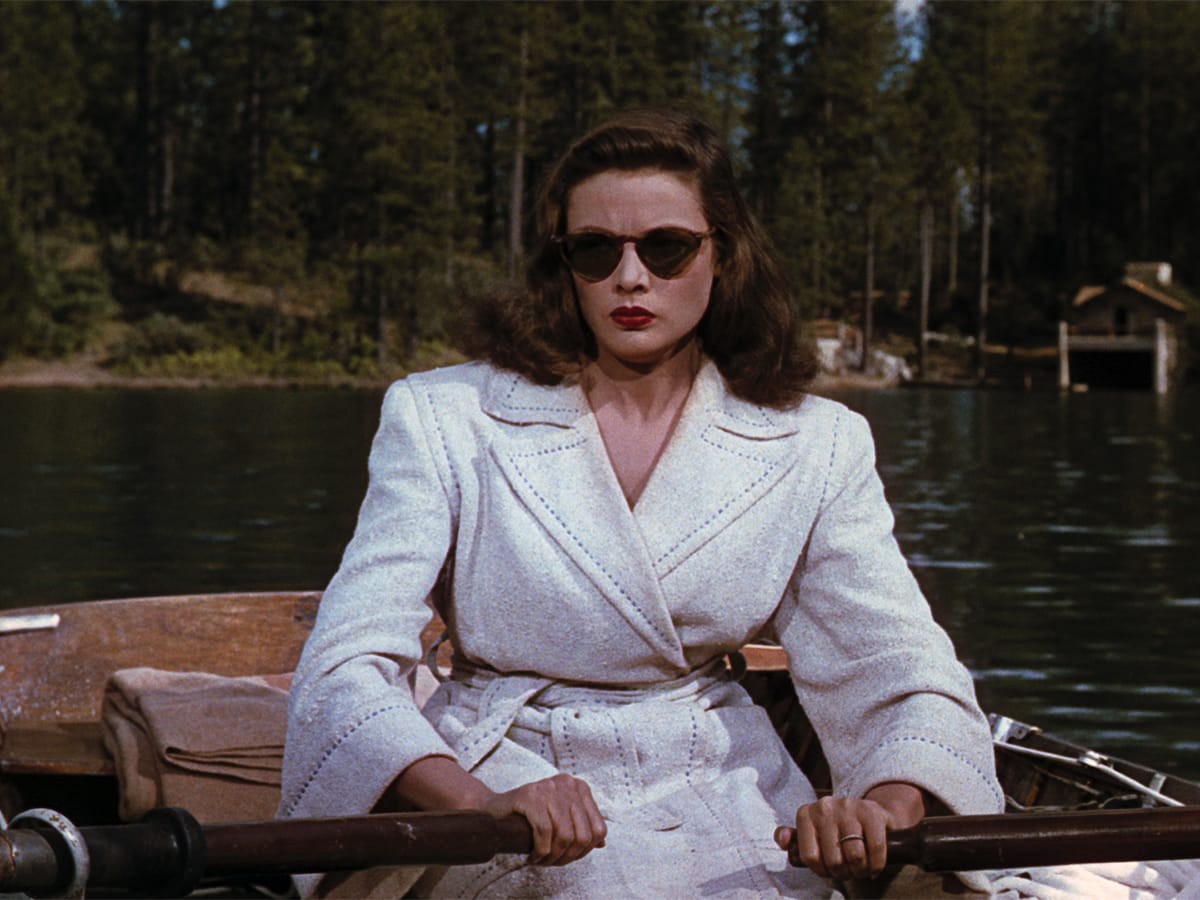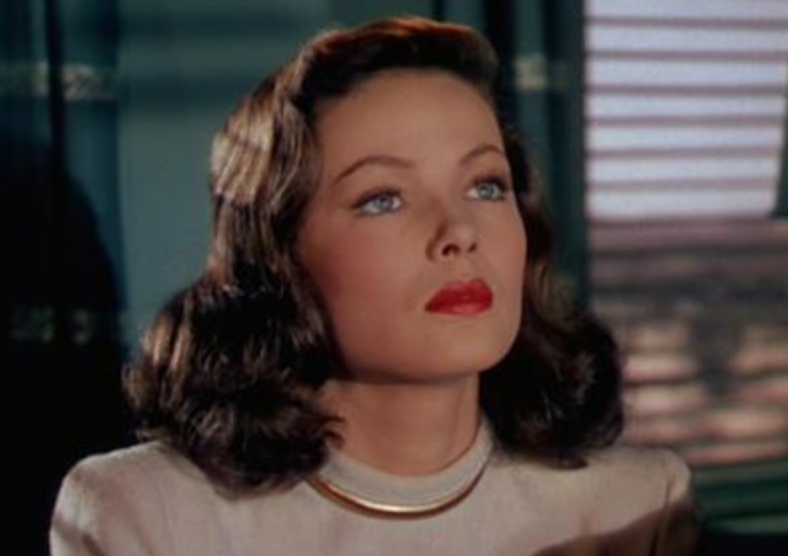by Jason Adams

The surface of the lake is calm -- almost, but not quite, like a mirror. It's a clinical aquamarine color, not much different from Gene Tierney's own eyes. Not that we can see her eyes -- she's just put on her sunglasses. They too act as mirrors -- dark mirrors, reflecting darkness. Ellen Berent Harland (Tierney) watches as the annoying little "cripple" Danny (Darryl Hickman) breaks the sheen of the lake's surface, as if slipping through into some unseen Wonderland -- they say repeatedly the water is warm, so warm, so very warm, but it looks to us cold, ice cold, and indeed the actor Hickman got pneumonia from the filming of this, Leave Her to Heaven's most infamous scene.
But then that's a sense that suffuses all of John M. Stahl's 1945 technicolor Noir masterpiece -- the feeling that something that sounds warm and inviting on its surface might actually be hiding an icy purgatory of horrors just beneath...
 That day on that Maine lake is bright and sunny, but that doesn't keep Danny from his dark fate; the waters of Maine aren't exactly known for their warmth. Similarly the majority of Leave Her to Heaven otherwise takes place in the deserts of New Mexico, and if you've ever been in the desert then you know how cold it can get. Colder than seems possible for a place so identified with heat.
That day on that Maine lake is bright and sunny, but that doesn't keep Danny from his dark fate; the waters of Maine aren't exactly known for their warmth. Similarly the majority of Leave Her to Heaven otherwise takes place in the deserts of New Mexico, and if you've ever been in the desert then you know how cold it can get. Colder than seems possible for a place so identified with heat.
Picture Tierney galloping across that desert, a sunset painting the place peach and pink as she dusts the dust with her father's ashes from a can, half of them spilling across her lap and her twisting it-must-be-said bosom, a voluptuous intermingling of sex and death that immediately betrays the too-close bond between daughter and now-deceased father. This bizarre horseback dance is what seems to finally ensnare poor dope Richard (Cornel Wilde) -- the music swells, his eyes bug out. He's a goner in a million ways.
Every moment he shares with Teirney in the film's early scenes scream to him, and to us, to run for the hills, but we can't much seem to see the warning signs just yet either -- we too are so entranced by Gene Tierney's surreal implacable beauty that we're just as sucked in. Think of their meet-cute on the train, which is anything but -- that aquamarine of Tierney's eyes is out in full force again, now painting the walls of the cabin; the patterns of curtain against horizontal blinds give the room a webbed feeling, where the spider lays in wait, not blinking its big beautifuls. The second he, and we, see her, that's that -- the story's as good as written.

Indeed it is -- it's there in her hand, and Richard's already a part of its pages. His picture on the back cover. He's an author you see, and she's reading one of his books. Or rather she's falling asleep in the middle of it -- she drops it as her boredom overwhelms her. Richard races to pick the book up off the floor. He hands it to her. She insults the book, because why not go that extra measure? And then she stares. And stares. And stares. Later we find out he reminds her of her father (because of course) but Ellen stares far past the point of comfort or cuteness -- Richard fumbles under her glare to light a cigarette and the scene plays out somewhat comically but Tierney never lets in on any joke. Ellen's eyes-of-envy gives off no heat -- just a clinical insistence. He's a bug already pinned to the mat.
That master of melodrama Douglas Sirk spent his career chasing after what John M. Dahl did decades earlier (Sirk remade two of Stahl's films, Imitation of Life and Magnificent Obsession) but Leave Her To Heaven always feels to me like the ultimate Sirk film -- hell it's pre-Kubrickian even. It stands out from Dahl's own filmography in its darkness, its coldness; in the way it subverts the American Dream by turning the Perfect Wife into the Perfect Nightmare. Richard smilingly calls Ellen his "perfect slave" at one point but little does he know how far this proto-BDSM relationship will drag him.
"There's nothing wrong with Ellen. It's just that she loves too much." That's how Ellen's mother describes her, once Ellen's love has started baring its fangs. The word we use for "loving too much" is "smothering" -- and please note the "mothering," the "is mothering," the "s'mothering" of that word in this context -- and it's amazing how heavy and airless Leave Her To Heaven becomes the deeper we sink into Ellen's web. Once Danny goes under that lake all semblance of outside prettiness evaporates -- Tierney's face becomes even more mask-like, and Ellen's costumes become quilted, heavy, frilly beasts, thickly embroidered with her initials and in colors and patterns that match the drapes and seat covers. There's no air in these rooms anymore. We're been doilied to death.
And Ellen's name and initials are indeed everywhere, once you start noticing -- like the way she bluntly proclaims herself "Winner!" after beating two children in a swim-race, Ellen is all about slapping her stamp onto things. She doesn't love, she possesses, and Tierney plays her like a calculating child who'll turn on her dollies if she doesn't like the way they are playing her game. She'll drag them all into hell, herself included, if that's the only way to win. Study Tierney's face as she stands at the top of the staircase about to self-abort in a fabulous see-through blue nightgown, perfume spritzed upon her arms and chest, little kitten heels -- it's the stink of triumph passing among those many cold, gorgeous shadows.

Previously: Laura
Next: The Ghost and Mrs Muir